United States Ambassador to the United Nations
| Ambassador of the United States to the United Nations | |
|---|---|
|
Seal of the United States Department of State | |
| Nominator | The President of the United States |
| Inaugural holder | Edward Stettinius Jr. |
| Formation | December 21, 1945 |
| Website | usun.state.gov |
The United States Ambassador to the United Nations is the leader of the U.S. delegation, the U.S. Mission to the United Nations. The position is more formally known as the "Permanent Representative of the United States of America to the United Nations, with the rank and status of Ambassador Extraordinary and Plenipotentiary, and Representative of the United States of America in the Security Council of the United Nations"; it is also known as the U.S. Permanent Representative, or "Perm Rep", to the United Nations.
The U.S. Permanent Representative, currently Nikki Haley, is charged with representing the United States on the U.N. Security Council and during almost all plenary meetings of the General Assembly, except in the rare situation in which a more senior officer of the United States (such as the U.S. Secretary of State or the President of the United States) is present. Like all United States ambassadors, he or she must be nominated by the U.S. President and confirmed by the Senate.
Many prominent U.S. politicians and diplomats have held the post, including Adlai Stevenson II, George H. W. Bush, Jeane Kirkpatrick, and Madeleine Albright.
Nikki Haley was nominated for this position by President Donald Trump[1] and was confirmed by the Senate. She assumed office upon presenting her credentials to the UN Secretary-General on January 27, 2017.
Cabinet status
Henry Cabot Lodge Jr., a leading moderate Republican who lost his seat in the United States Senate to John F. Kennedy in the 1952 elections, was appointed ambassador to the United Nations in 1953 by Dwight D. Eisenhower in gratitude for the defeated senator's role in the new president's defeat of conservative leader Robert A. Taft for the 1952 Republican nomination and subsequent service as his campaign manager in the general election; Eisenhower raised the ambassadorship to cabinet rank in order to give Lodge direct access to him without having to go through the State Department.[2]
The ambassadorship continued to hold this status through the Ford, Carter, and Reagan administrations but was removed from cabinet rank by George H. W. Bush, who had previously held the position himself. It was restored under the Clinton administration. It was not a cabinet-level position under the George W. Bush administration (from 2001 to 2009),[3][4] but was once again elevated under the Obama administration, and retained by the Trump administration.[5]
Former UN Ambassador John R. Bolton has publicly opposed the granting of cabinet-level status to the office, stating "One, it overstates the role and importance the U.N. should have in U.S. foreign policy, second, you shouldn't have two secretaries in the same department".
List of Ambassadors
The following is a chronological list of those who have held the office:
| # | Ambassador | Years served | U.S. President |
|---|---|---|---|
| 1 |  Edward Stettinius, Jr. Edward Stettinius, Jr. |
January 17, 1946 – June 3, 1946 | Harry Truman |
| — |  Herschel Johnson Herschel Johnson |
June 3, 1946 – January 14, 1947 Acting | |
| 2 | 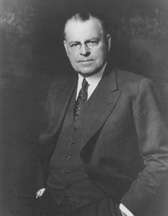 Warren Austin Warren Austin |
January 14, 1947 – January 22, 1953 | |
| Dwight D. Eisenhower | |||
| 3 | 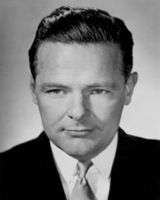 Henry Cabot Lodge, Jr. Henry Cabot Lodge, Jr. |
January 26, 1953[6] – September 3, 1960 | |
| 4 |  James Jeremiah Wadsworth James Jeremiah Wadsworth |
September 8, 1960 – January 21, 1961 | |
| John Kennedy | |||
| 5 |  Adlai Stevenson Adlai Stevenson |
January 23, 1961 – July 14, 1965 | |
| Lyndon B. Johnson | |||
| 6 |  Arthur Goldberg Arthur Goldberg |
July 28, 1965 – June 24, 1968 | |
| 7 |  George W. Ball George W. Ball |
June 26, 1968 – September 25, 1968 | |
| 8 |  James Russell Wiggins James Russell Wiggins |
October 7, 1968 – January 20, 1969 | |
| 9 | 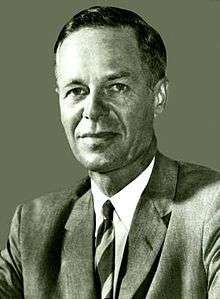 Charles Woodruff Yost Charles Woodruff Yost |
January 23, 1969 – February 25, 1971 | Richard Nixon |
| 10 | 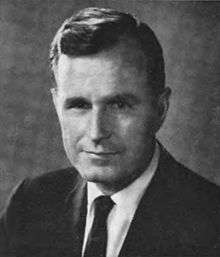 George H. W. Bush George H. W. Bush |
March 1, 1971 – January 18, 1973 | |
| 11 |  John A. Scali John A. Scali |
February 20, 1973 – June 29, 1975 | |
| Gerald Ford | |||
| 12 |  Daniel Patrick Moynihan Daniel Patrick Moynihan |
June 30, 1975 – February 2, 1976 | |
| 13 |  William Scranton William Scranton |
March 15, 1976 – January 19, 1977 | |
| 14 |  Andrew Young Andrew Young |
January 30, 1977 – September 23, 1979 | Jimmy Carter |
| 15 |  Donald McHenry Donald McHenry |
September 23, 1979 – January 20, 1981 | |
| 16 |  Jeane Kirkpatrick Jeane Kirkpatrick |
February 4, 1981 – April 1, 1985 | Ronald Reagan |
| 17 |  Vernon A. Walters Vernon A. Walters |
May 22, 1985 – March 15, 1989 | |
| George H. W. Bush | |||
| 18 |  Thomas R. Pickering Thomas R. Pickering |
March 20, 1989 – May 7, 1992 | |
| 19 |  Edward J. Perkins Edward J. Perkins |
May 12, 1992 – January 27, 1993 | |
| Bill Clinton | |||
| 20 | 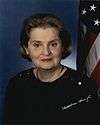 Madeleine Albright Madeleine Albright |
January 27, 1993 – January 21, 1997 | |
| 21 |  Bill Richardson Bill Richardson |
February 18, 1997 – August 18, 1998 | |
| — |  Peter Burleigh Peter Burleigh |
August 18, 1998 – September 7, 1999 Acting | |
| 22 |  Richard Holbrooke Richard Holbrooke |
September 7, 1999 – January 20, 2001 | |
| — | 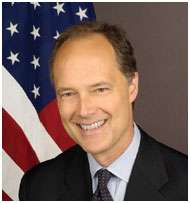 James B. Cunningham James B. Cunningham |
January 20, 2001 – September 19, 2001 Acting |
George W. Bush |
| 23 |  John Negroponte John Negroponte |
September 19, 2001 – June 23, 2004 | |
| 24 | |
July 23, 2004 – January 20, 2005 | |
| — |  Anne W. Patterson Anne W. Patterson |
January 20, 2005 – August 2, 2005 Acting | |
| 25 |  John R. Bolton John R. Bolton |
August 2, 2005 – December 31, 2006 Recess appointment, not confirmed by the U.S. Senate | |
| — |  Alejandro Daniel Wolff Alejandro Daniel Wolff |
December 31, 2006 – April 30, 2007 Acting | |
| 26 |  Zalmay Khalilzad Zalmay Khalilzad |
April 30, 2007 – January 22, 2009 | |
| Barack Obama | |||
| 27 |  Susan Rice Susan Rice |
January 26, 2009 – June 30, 2013 | |
| — |  Rosemary DiCarlo Rosemary DiCarlo |
June 30, 2013 – August 5, 2013 Acting | |
| 28 |  Samantha Power Samantha Power |
August 5, 2013 – January 20, 2017 | |
| – | 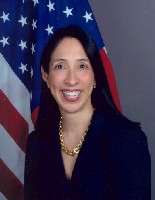 Michele J. Sison Michele J. Sison |
January 20, 2017 – January 27, 2017 Acting |
Donald Trump |
| 29 |  Nikki Haley Nikki Haley |
January 27, 2017 – present |
See also
Notes
- ↑ "Trump chooses women for Cabinet: Haley for UN, DeVos for Ed". The Big Story. Retrieved 2016-11-23.
- ↑ Hubbard, James P. (2011). The United States and the End of British Colonial Rule in Africa, 1941-1968. Jefferson City, NC: McFarland & Company. p. 172. ISBN 978-0-7864-5952-0.
- ↑ Kelemen, Michele (December 1, 2008). "U.N. Envoy Nominee Rice Known As Smart, Tough". National Public Radio. Retrieved January 21, 2009.
The head of the United Nations Foundation, a Washington-based advocacy group, released a statement praising Rice as well as Obama's decision to make the post of U.N. ambassador a Cabinet-level position once again—as it was during the Clinton years.
- ↑ Cooper, Helene (November 20, 2008). "Clinton Decision Holding Up Other Obama Choices". New York Times. Retrieved February 9, 2009.
Ms. Rice could get the post of United States ambassador to the United Nations, a cabinet-level position under President Clinton. President Bush downgraded the position when he came into office
- ↑ Walker, Hunter. "President Trump announces his full Cabinet roster." Yahoo News. 2017-02-07. Retrieved 2017-02-08.
- ↑ Chesly Manly (January 27, 1953). "Lodge Asks FBI to Screen All U.S. Aids [sic] on U.N.". Chicago Tribune. Chicago Tribune Press Service.

